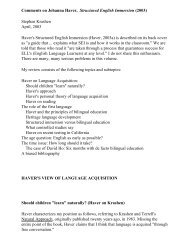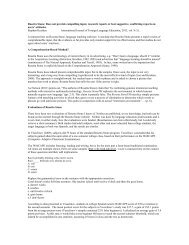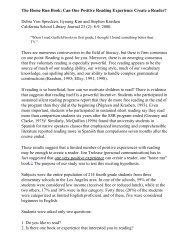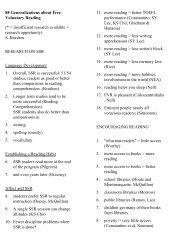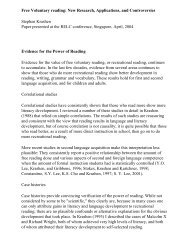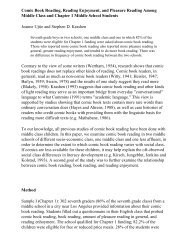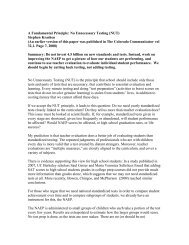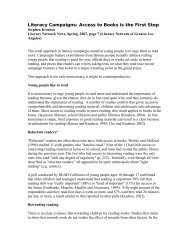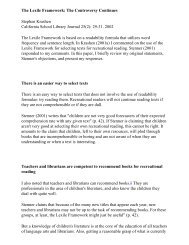Second Language Acquisition and Second ... - Stephen Krashen
Second Language Acquisition and Second ... - Stephen Krashen
Second Language Acquisition and Second ... - Stephen Krashen
Create successful ePaper yourself
Turn your PDF publications into a flip-book with our unique Google optimized e-Paper software.
motivation played no role because of political ill-feelings. Sixty Mexican-American<br />
females were surveyed in New Mexico, all from low-income families. The subjects who<br />
were more proficient in English (a Cloze test was used) tended to rate Americans lower<br />
on certain personality traits that are valued by the subjects (religious, sensitive, shy,<br />
considerate). Oller et al. suggest that these people "fell the oppressive weight of having<br />
been absorbed into a powerful political system in which they have traditionally had little<br />
power of choice" (p. 182)<br />
Below we review personality factors in relation to prediction no. 3, beginning with those<br />
factors relating to self-confidence. Recall that these factors are predicted to be strongest<br />
in intake-rich situations, <strong>and</strong> will emerge most clearly in Monitor-free tests, but will be<br />
present to at least some extent when subconscious acquisition is involved.<br />
Anxiety. There appears to be a consistent relationship between various forms of anxiety<br />
<strong>and</strong> language proficiency in all situations, formal <strong>and</strong> informal. Anxiety level may thus<br />
be a very potent influence on the affective filter. These studies have shown a<br />
relationship between low anxiety <strong>and</strong> language acquisition: Carroll (1963) noted a small<br />
negative correlation (r = -0.20, n = 68) between test anxiety <strong>and</strong> accomplishment in<br />
intensive foreign language courses. Gardner, Smythe, Clement, <strong>and</strong> Gliksman (1976)<br />
reported that classroom anxiety correlated with speech skills as well as grades in French<br />
as a foreign language in grades 7 to 11 in Canada. There was a trend for low anxiety to<br />
be more closely related to speech (Monitor-free) test than to grades. Naimon, Fröhlich,<br />
Stern, <strong>and</strong> Todesco (1978) found that for their subjects (French students in grades 8 to<br />
12 in Toronto) classroom anxiety, a high fear of rejection <strong>and</strong> similar feelings may be<br />
related to failure. Also, a composite variable consisting of certainty in h<strong>and</strong>-raising,<br />
reaction to being called on without h<strong>and</strong>-raising, <strong>and</strong> embarrassment in speaking French,<br />
called "overall classroom personality" related to achievement on an imitation test ( r =<br />
0.361, p < 0.01) as well as listening comprehension (r = 0.380, p < 0.01). Wittenborn,<br />
Larsen, <strong>and</strong> Vigil (1945; reported in Pimsleur, Mosberg, <strong>and</strong> Morrison, 1962) studied<br />
college French <strong>and</strong> Spanish students, <strong>and</strong> found that low <strong>and</strong> high achievers may be<br />
distinguished by level of anxiety as well as a degree of self-confidence. Dunkel (1947;<br />
also cited<br />
29



